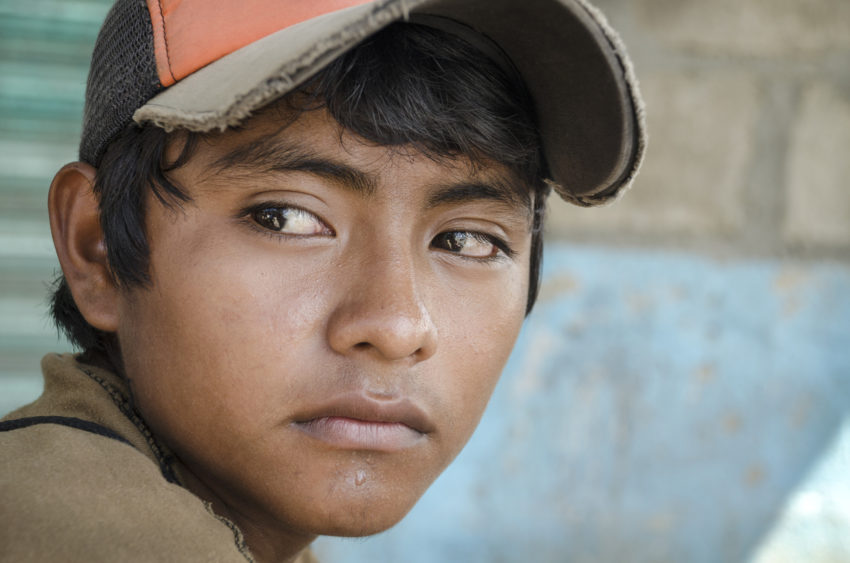
Share On Social!
Many children in the U.S. have lost a parent or caregiver due to the COVID-19 pandemic.
In fact, 1 in 500 U.S. children have experienced COVID-19 associated orphanhood, and Latinos and others of color are particularly affected, according to a new study in the journal Pediatrics.
“From April 1, 2020 through June 30, 2021, data suggest that more than 140,000 children under age 18 in the United States lost a parent, custodial grandparent, or grandparent caregiver who provided the child’s home and basic needs, including love, security, and daily care,” states the study, led by researchers at CDC, Harvard University, Imperial College of London, and others.
The study found that the pandemic accentuated racial, ethnic, and geographical disparities associated with the deaths of caregivers.
What Are the Findings on Lost Caregivers Due to COVID-19?
Researchers analyzed COVID-19 associated orphanhood (death of one or both parents as defined by UNICEF) between April 1, 2020, and June 30, 2021 for each state using information on mortality, census data, and fertility.
Key findings from the study in Pediatrics:
- About 120,630 U.S. children lost a primary caregiver, (a parent or grandparent responsible for providing housing, basic needs and care) due to COVID-19-associated death.
- 22,007 children experienced the death of a secondary caregiver (grandparents providing housing but not most basic needs).”
- “142,637 children are estimated to have experienced the death of at least one parent, or a custodial or other co-residing grandparent caregiver.
- States with higher populations experienced higher numbers of children facing COVID-19- associated death of primary caregivers: California (16,179), Texas (14,135), and New York (7,175).
- American Indian/Alaska Native children were 4.5 times more likely to lose a parent or grandparent caregiver, Black children were 2.4 times more likely, and Hispanic children were 1.8 times more likely.
The findings also suggest significant racial and ethnic disparities in the distribution of COVID-19-associated death of parents and caregivers.
States along the border experienced high mortality rates in Latino areas.
“Along the U.S.-Mexico border, including New Mexico, Texas, and California, between 49% and 67% of children who lost a primary caregiver were of Hispanic ethnicity,” according to the study.
Why Did Children of Color Face Caregiver Loss during the COVID-19 Pandemic?
Several contributors caused the disparities, according to the researchers.
“[Disparities] might be influenced by variations in fertility, age at childbearing, comorbidities, access to health services, social vulnerability, longevity, and rates of caregiving by grandparents,” as mentioned by the study in Pediatrics.
For the duration of the pandemic and long before, Latinos and other people of color have faced many structural and systemic barriers to health equity.
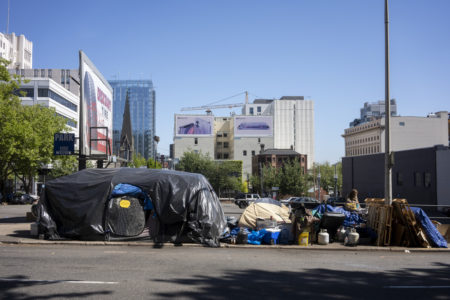 The social determinants of health, which include poor access to transit and green spaces, occupation, economic instability, lacking healthcare insurance, and unstable housing may also increase exposure to COVID-19.
The social determinants of health, which include poor access to transit and green spaces, occupation, economic instability, lacking healthcare insurance, and unstable housing may also increase exposure to COVID-19.
This week, the Latino COVID-19 death rate milestone has reached an unprecedented amount — over 131,103 lives lost, according to a Salud America! report.
The staggering loss of life gave Día de Los Muertos a new meaning for Latinos who lost loved ones during the pandemic.
Maria Alvarez is a volunteer in the organization of a funeral mass for the members of her Latino community who have died during the pandemic.
“[COVID-19] affected us a lot. We lost a lot of people from COVID,” said Alvarez, according to ABC News. “That’s why we asked to do it now in October because it’s for the Día de Los Muertos.”
The Effects of Losing a Parent/Caregiver on Latino Children
Family is something that Latinos value dearly.
It is no surprise that many Latino households are multi-generational families (many families living in one house/apartment).
“Latino caregivers may spend more hours a week giving care and taking on more intensive caregiving needs, than caregivers from other ethnic groups. Additionally, 43% of Latino caregivers live with their loved ones versus 32% of non-Latino caregivers,” stated a Salud America! report.
COVID-19 has negatively impacted the stability of the household. It has increased Latino caregivers’ stress, anxiety, and depression as they care for patients with chronic diseases like Alzheimer’s Disease. The loss of a parent or grandparent is an experience that will change a child’s life forever.
This traumatic early experience can be linked to many impairments in Latino children’s social, emotional, and academic achievement as mentioned in a key finding in a Salud America! research review.
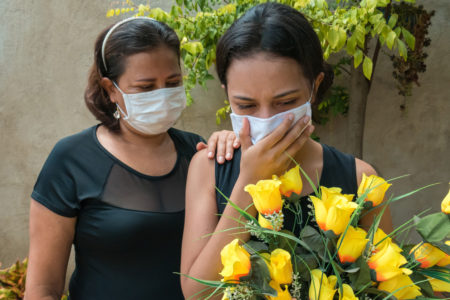
“Loss of a parent is among the adverse childhood experiences (ACEs) linked to mental health problems; shorter schooling; lower self-esteem; sexual risk behaviors; and increased risk of substance abuse, suicide, violence, sexual abuse, and exploitation,” according to the Pediatrics study.
Mental health professionals are utilizing emerging methods to help heal children from trauma, such as art therapy.
Mental health professionals hope that art therapy—a mental health service that utilizes creativity to help people resolve psychological issues—will provide healing comfort to children, according to a Salud America! report.
Dr. Luz Garcini of UT Health San Antonio also runs innovative online programs to help Latinos heal from the loss of a loved one.
“One of the biggest needs that we see in the community right now is that there has been a lot of loss and grief, particularly associated to the loss of loved ones over the current [COVID-19] pandemic, that has not been addressed,” said Garcini.
What Can You Do to Support These Children?
Increased awareness of children facing orphanhood due to the pandemic is a top priority for healthcare and community leaders, said Susan Hillis, CDC researcher and lead author of the study.
“The death of a parental figure is an enormous loss that can reshape a child’s life. We must work to ensure that all children have access to evidence-based prevention interventions that can help them navigate this trauma, to support their future mental health and wellbeing,” said NIDA Director Dr. Nora D. Volkow.
The study recommends evidence-based responses to improve children’s outcomes, including:
- Support and services like foster care for the bereaved families.
- Programs to foster child resilience, adversity and promote nurturing relationships. For example, Salud America! Salud Hero Elaine Hartle of San Antonio is helping prepare foster youth for life’s challenges.
- Age-specific strategies for children that take into account racial disparities and structural inequities.
Hillis and the other authors also hope their study encourages people to think about the impact of COVID-19 on family members and children left behind.
“Children losing caregivers to COVID-19 need care and safe, stable, and nurturing families with economic support, quality childcare and evidence-based parenting support programs. There is an urgent need to mount an evidence-based comprehensive response focused on those children at greatest risk, in the states most affected,” according to the researchers.
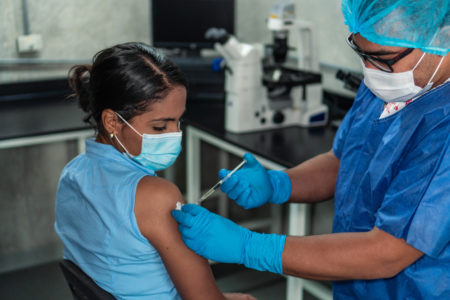 We can also support children by helping people in our community get vaccinated against COVID-19.
We can also support children by helping people in our community get vaccinated against COVID-19.
Stay informed on the COVID-19 vaccine to prevent vaccine misinformation.
You can help the children impacted by COVID-19 in your community by downloading a Health Equity Report Card from Salud America!
This report card displays data and resources your community has access to for healthcare, food, education, and other health equity related issues. You can advocate for your neighbors and present the Health Equity Report Card to your city’s leadership!
GET YOUR HEALTH EQUITY REPORT CARD!
By The Numbers
142
Percent
Expected rise in Latino cancer cases in coming years

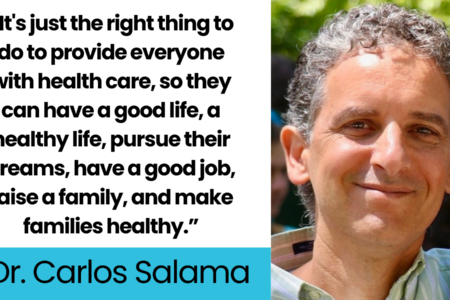

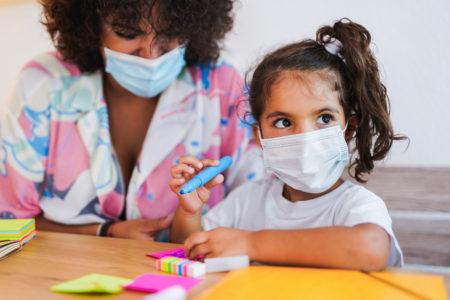
[…] The pandemic is another chapter in the bitter story of American racism and inequality. Black and Latinx people are being infected and are dying at much higher rates than white Americans. Many people of […]
[…] coronavirus has killed over 61,000 Latinos in America according to the CDC, accounting for over 18.2% of the total COVID deaths in the […]
[…] Whereas Hispanics make up 11% of D.C.’s inhabitants, they signify 19% of the COVID cases, and 14% of the deaths. Equally, 46% of D.C.’s residents are Black, they usually make up an alarming 75% […]
[…] and historical mistreatment. According to the U.S. Centers for Disease Control and Prevention, Latino and Black American communities are three times more likely to become infected with […]
[…] Covid pandemic has hit the Latino community particularly hard, and data from the nonprofit health equity advocacy group Salud America! shows Latinos lead in the 0-24 age […]
[…] the pandemic, Latinos took major blows, both in terms of COVID-19 cases and also from the economic recession under former President Donald Trump. Nearly half (49%) of […]
[…] the positive trend, the harm may have already been done. The pandemic has disproportionately impacted Latino communities. Reuters reported that election-related or political disinformation that […]
[…] pesar de la tendencia positiva, es posible que el daño ya esté hecho. La pandemia ha impactado desproporcionadamente Comunidades latinas. Reuters informó que la desinformación política o relacionada con las […]
[…] residentes blancos muestran una tasa mucho más baja con 10 muertes por cada 100,000 habitantes(8 9) . Los afroestadounidenses por su parte, denuncian subsistemas de salud que les segregan […]
[…] https://salud-america.org/coronavirus-case-rates-and-death-rates-for-latinos-in-the-united-states/ […]
[…] https://salud-america.org/coronavirus-case-rates-and-death-rates-for-latinos-in-the-united-states/ […]
[…] communities have the second-highest number of COVID-19 cases in the U.S. They’re also more likely to become hospitalized and die from the disease than other […]
[…] total, around 160,000 Latinos were killed by COVID-19. This accounts for 16% of the 1 million deaths in the country. The […]